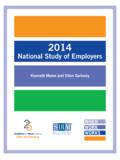Transcription of Early Childhood Educators of British Columbia …
1 Early Childhood Educators of British Columbia Code of ETHICS. ECEBC Early Childhood Educators of BC. 1 12/11/2010 3:44:22 PM. Early Childhood Educators of British Columbia (ECEBC) wishes to gratefully acknowledge the Child Care Initiatives Fund (CCIF) for supporting this project. The research and code development were conducted by Frances Ricks, PhD, and Sandra Griffin, MA, from the School of Child and Youth Care at the University of Victoria, British Columbia . Early Childhood Educators of British Columbia 2774 East Broadway, All rights reserved. No part of this Vancouver, BC V5M 1Y8 book may be reproduced Tel: (604) 709-6063 in any form by any means without Toll Free: 1-800-797-5602 written permission from the Fax: (604) 709-6077 publisher.
2 ISBN: 0-9682222-3-4. Sixth edition, October 2008 Printed in Canada 2 12/11/2010 3:44:22 PM. Introduction to the ECEBC Code of Ethics E arly Childhood Educators work with one of society's most vulnerable groups young children. The quality of the interactions between young children and their caregivers has a significant, enduring impact on the children's lives. The intimacy of the relationship and the potential that exists to do harm call for a commitment on the part of Early Childhood Educators to the highest standards of ethical practice. While individual children are the focus of the work done by Early Childhood Educators , ethical practice extends beyond the child-educator relationship.
3 Early Childhood Educators care for and educate young children while recognizing and supporting the nurturing and socializing responsibilities of the children's families. Early Childhood Educators accept their ethical obligations to the children and families they serve as both represent our society's future. ECEBC recognizes its responsibility to promote ethical practices and attitudes on the part of Early Childhood Educators . The following principles, explanations and standards of practice have been developed to help Early Childhood Educators monitor their professional practice.
4 They are intended to both guide Educators and protect the children and families with whom they work. Professionalism creates additional ethical obligations to colleagues and to the profession. 1. 3 12/11/2010 3:44:22 PM. Structure and derivation of the Code T his code articulates the principles and standards of practice endorsed by ECEBC. Members of ECEBC undertake, as a condition of membership in the association, to incorporate them into their practice. ECEBC advocates the voluntary acceptance of these principles and standards by all Early Childhood Educators , both members and non-members.
5 Structure Eight ethical principles are presented. These principles are intended to guide Early Childhood Educators in deciding what conduct is right and correct. Educators may use the principles to help them make decisions when they encounter ethical problems in the course of their work. Each principle is followed by an explanation and a list of standards of practice that represent an application of the principle in an Early Childhood setting. Derivation These ethical principles were agreed upon by the ECEBC after reviewing the literature on the topic of ethics, examining and evaluating the codes of ethics of various professions, and consulting a number of experts in the field of professional ethics.
6 These principles reflect the core values of Early Childhood education practice which are addressed in the codes of ethics of professional organizations in other jurisdictions. 2. 4 12/11/2010 3:44:22 PM. When principles conflict A ll eight principles are reflected in the ethical practice of Early Childhood Educators . However, there will be circumstances in which the ethical principles will conflict and Educators will face the dilemma of having to choose between conflicting principles. In these difficult situations it is recommended that Early Childhood Educators carefully think through the likely consequences of giving each of the conflicting principles primacy.
7 By evaluating the consequences it may become clear which principle ought to be given more weight. ECEBC recognizes that the resolution of ethical dilemmas can be difficult. Educators are encouraged, if time permits, to consult with colleagues and obtain different perspectives on the problem. If this consultation does not clarify the best course of action, Educators are encouraged to contact the Executive Director at the ECEBC office for guidance. Although the final decision will be made by the individual educator facing the ethical dilemma, consultation with others indicates a commitment to ethical practice.
8 3. 5 12/11/2010 3:44:22 PM. The principles of the Code Early Childhood Educators promote the health and well-being of all children. Early Childhood Educators use developmentally appropriate practices when working with all children. Early Childhood Educators demonstrate caring for all children in all aspects of their practice. Early Childhood Educators work in partnership with parents, supporting them in meeting their responsibilities to their children. Early Childhood Educators work in partnership with colleagues and other service providers in the community to support the well-being of families.
9 Early Childhood Educators work in ways that enhance human dignity. Early Childhood Educators pursue, on an ongoing basis, the knowledge, skills and self-awareness needed to be professionally competent. Early Childhood Educators demonstrate integrity in all of their professional relationships. 4. 6 12/11/2010 3:44:22 PM. Early Childhood Educators promote the health and well-being of all children. Explanation Early Childhood Educators are responsible for the children in their care. They create environments for children that are safe, secure and supportive of good health in the broadest sense.
10 They design programs that provide children with opportunities to develop physically, socially, emotionally, morally, spiritually, cognitively and creatively. A healthy environment for children is one in which each child's self-esteem is enhanced, play is encouraged, and a warm, loving atmosphere is maintained. Implications for practice In adhering to this Principle, an Early Childhood educator would: Promote each child's health and well-being. Create and maintain safe and healthy environments for children. Foster all facets of children's development.



